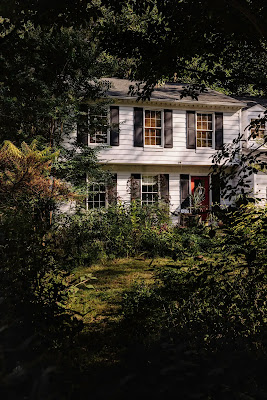 |
| The yard (Photo by Jason Andrew, The New York Times) |
Janet and Jeff Crouch of Columbia, Md., had "lived on their quiet cul-de-sac harmoniously with their neighbors for years, and chose native plants to help insects, birds and wildlife thrive," reports Cara Buckley of The New York Times. Then they got a letter from their homeowners' association saying, "Your yard is not the place for such a habitat." The letter gave the Crouches "10 days to convert their front yard into a lawn that looked like everyone else’s."
The Crouches were not willing to tear up their nature haven without a fight that cost them $60,000. "They hired a lawyer and contacted every wildlife and environmental group they could think of, along with local legislators," Buckley reports. They filed a lawsuit, and two months later, "a Maryland state representative asked if they would allow their case to form the basis of a new environmental law. . . . A bill was drafted that forbade homeowner associations from banning pollinator plants or rain gardens, or from requiring property owners to plant turf grass. The measure gained bipartisan support, passed with near unanimity, and became law in October 2021."
Mary Catherine Cochran, former legislative director for Delegate Terri L. Hill, told Buckley that "Maryland law was the first in the country to limit homeowner-association control over eco-friendly yards."
"Lawns make up one-third of the country’s 135 million acres of residential landscaping," ecologist Douglas W. Tallamy told Buckley. Tallamy, whose book, Nature’s Best Hope, urges homeowners to change their yards into conservation corridors told Buckley, “This idea that humans and nature cannot coexist is destroying the entire planet, which in turn is destroying humans. The only way forward is to coexist. . . . Now people know if they fight back, they can win.”
The Crouches were not willing to tear up their nature haven without a fight that cost them $60,000. "They hired a lawyer and contacted every wildlife and environmental group they could think of, along with local legislators," Buckley reports. They filed a lawsuit, and two months later, "a Maryland state representative asked if they would allow their case to form the basis of a new environmental law. . . . A bill was drafted that forbade homeowner associations from banning pollinator plants or rain gardens, or from requiring property owners to plant turf grass. The measure gained bipartisan support, passed with near unanimity, and became law in October 2021."
Mary Catherine Cochran, former legislative director for Delegate Terri L. Hill, told Buckley that "Maryland law was the first in the country to limit homeowner-association control over eco-friendly yards."
"Lawns make up one-third of the country’s 135 million acres of residential landscaping," ecologist Douglas W. Tallamy told Buckley. Tallamy, whose book, Nature’s Best Hope, urges homeowners to change their yards into conservation corridors told Buckley, “This idea that humans and nature cannot coexist is destroying the entire planet, which in turn is destroying humans. The only way forward is to coexist. . . . Now people know if they fight back, they can win.”
No comments:
Post a Comment